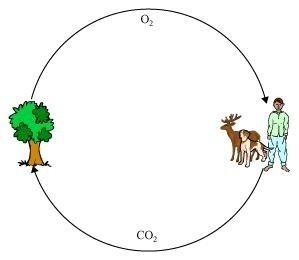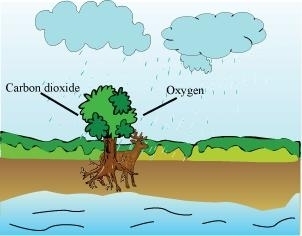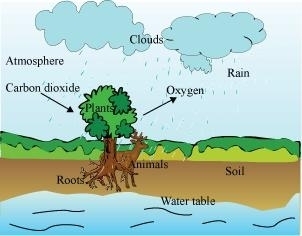Exercise : Solutions of Questions on Page Number : 217
Q1 : Explain how animals dwelling in the forest help it grow and regenerate.
Answer :
The animals in forests are of various types. These could be herbivores, carnivores, micro-organisms, etc. These play an important role in maintaining the food chains.
(i) Micro-organisms convert the dead plants and animals to humus. This humus helps in returning the nutrients back to the soil. These are absorbed by plants.
(ii) The animals also help in dispersing the seeds of certain plants.
(iii) The decaying animal dung provides nutrients to various types of seedlings to grow.
All these activities of animals dwelling in the forest help it to grow and regenerate.
Q2 : Explain how forests prevent floods.
Answer :
Forest acts as a natural absorber of water. It allows rain water to seep through. In the absence of trees, the rain water would hit the ground directly resulting in flood. However, because of the presence of trees, rain water does not hit the ground directly. It rather hits the ground slowly. Hence, before flooding, all the rain water seeps through ground. In this way, forests prevent floods
Q3 : What are decomposers? Name any two of them. What do they do in the forest?
Answer :
Decomposers are micro-organisms that convert the dead plants and animals to humus.
Bacteria and fungi are the two types of decomposers.
They help in the process of recycling of nutrients by decomposing various dead organisms such as plants and animals to form humus.
Q4 : Explain the role of forest in maintaining the balance between oxygen and carbon dioxide in the atmosphere.
Answer :
Forests are called the green lungs. This is because plants in forests release oxygen through the process of photosynthesis and help in providing oxygen to animals for respiration. Plants consume carbon dioxide released by the animals. In this way, plants help in maintaining a balance of oxygen and carbon dioxide in atmosphere.

Q5 : Explain why there is no waste in a forest.
Answer :
There is no waste in a forest because micro-organisms act on the wastes and convert them to humus. This humus ensures that the nutrients are returned back to the soil.
Q6 : List five products we get from forests.
Answer :
(i) Medicines
(ii) Wood
(iii) Paper
(iv) Oil
(v) Gum
Exercise : Solutions of Questions on Page Number : 218
Q7 : List five products we get from forests.
Answer :
(i) Medicines
(ii) Wood
(iii) Paper
(iv) Oil
(v) Gum
Q8 : Why should we worry about the conditions and issues related to forests far from us?
Answer :
There are various reasons for which we should be vigilant about matters related to forests.
(i) A decrease in forest area would lead to an increase in carbon dioxide in air. This will lead to an increase of earth’s temperature.
(ii) Soil erosion would occur if there are no forests.
(iii) Floods would be more frequent in absence of forests.
(iv) Forests provide shelter and food to animals. When forests are adversely affected, the habitats of wild animals are also adversely affected.
Therefore, we need to conserve our forests.
Q9 : Explain why there is a need of variety of animals and plants in a forest.
Answer :
A greater variety of plants and animals in the forests helps it to regenerate and grow. Greater variety of plants means more food and habitat for the herbivores. An increase in herbivores means more food for carnivores. Decomposers help to maintain the supply of nutrients to the soil and to the growing plants. This wide variety makes forest a dynamic living entity.
Q10 : In figure, the artist has forgotten to put the labels and directions on the arrows. Mark the directions on the arrows and label the diagram using the following labels:

clouds, rain, atmosphere, carbon dioxide, oxygen, plants, animals, soil, roots, water table
Answer :

Q11 : Which of the following is not a forest product?
(i) Gum
(ii) Plywood
(iii) Sealing wax
(iv) Kerosene
Answer :
(iv)Kerosene
Q12 : Which of the following statements is not correct?
(i) Forests protect the soil from erosion.
(ii) Plants and animals in a forest are not dependent on one another.
(iii) Forests influence the climate and water cycle.
(iv) Soil helps forests to grow and regenerate.
Answer :
(ii)Plants and animals in a forest are not dependent on one another.
Exercise : Solutions of Questions on Page Number : 219
Q13 : Micro-organisms act upon the dead plants to produce
(i) sand
(ii) mushrooms
(iii) humus
(iv) wood
Answer :
(iii) humus